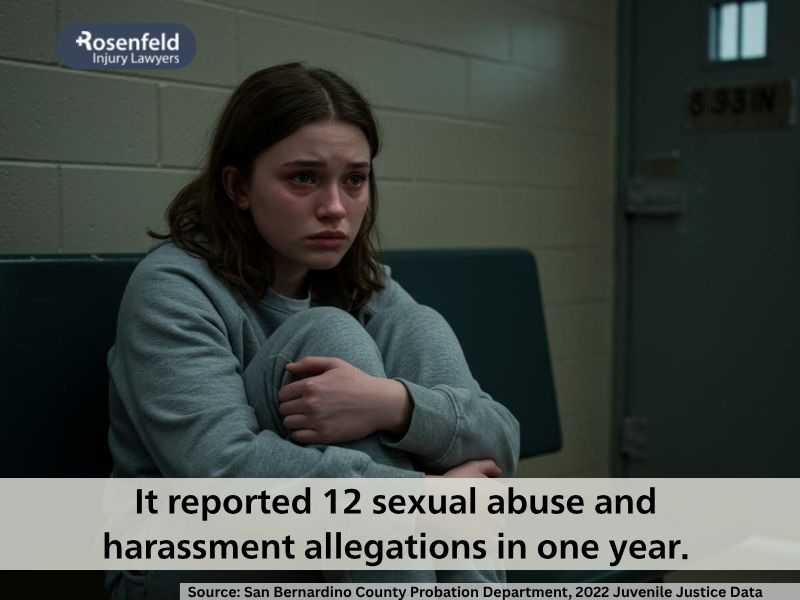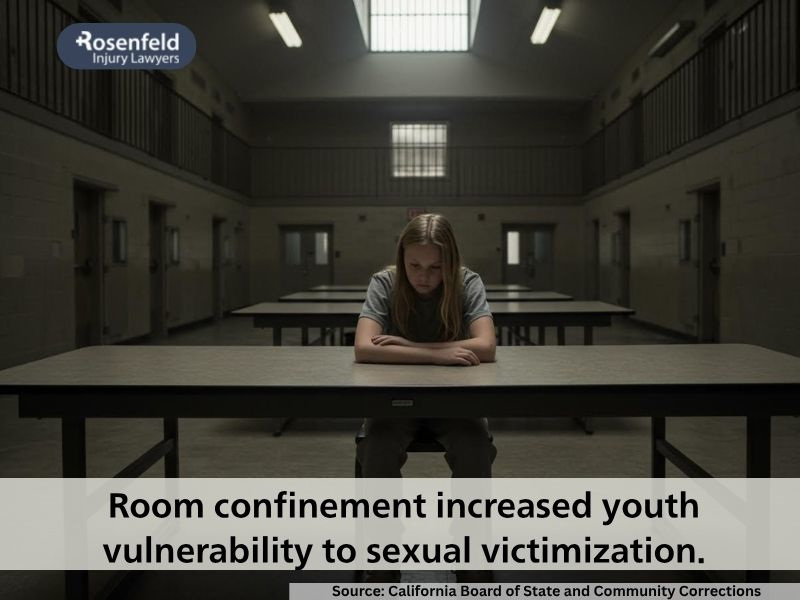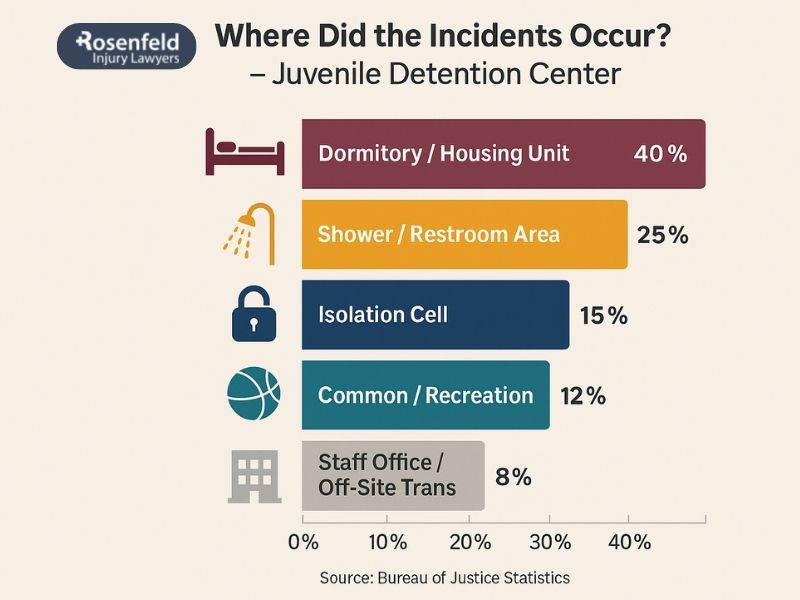San Bernardino County Juvenile Detention Center Sexual Abuse Lawsuits
Compensation for Victims Sexually Abused in Juvenile Detention Centers Like CVJDAC, SBYJC, and HDJDAC
San Bernardino County Juvenile Detention Center sexual abuse claims help child survivors seek justice from powerful institutions that fail to protect victims. Injury Lawyer Team takes a trauma-informed approach to California juvenile detention center sexual abuse lawsuits, ensuring that the victim’s well-being is centered in every aspect of the legal process.
Contact us today to learn about taking legal action for the systemic failures of the San Bernardino County justice system.

Alleged Abuse at San Bernardino County Juvenile Detention Facilities
Advocacy groups and survivors allege that a troubling pattern of institutional abuse is taking place in California juvenile detention centers, including those in San Bernardino County. Excessive use of force, inappropriate touching, and sexual abuse have caused untold psychological harm to vulnerable youth in the county’s custody.
The Central Valley Juvenile Detention and Assessment Center (CVJDAC)
Located in San Bernardino, the Central Valley Juvenile Detention and Assessment Center can house approximately 220 at-risk youth and is primarily staffed by probation officers. The facility offers behavioral health treatment and educational programs to prevent recidivism.
The facility claims that both staff members and juveniles are informed about the Prison Rape Elimination Act (PREA), warning signs of sexual abuse, and how to report sexual misconduct.
However, this detention center is part of a larger pattern of sexual victimization throughout California’s juvenile justice system, with multiple survivors coming forward with sexual abuse claims.
Sex Abuse Lawsuit Against Probation Officer at Gilbert Street Juvenile Hall
In December 2023, four survivors took legal action against the Gilbert Street Juvenile Hall, alleging that they were sexually abused by a probation officer. One plaintiff was only ten years old when the abuse occurred, stating that he was afraid to get up and use the bathroom at night in case his abuser was present.
The 2024 PREA Report for CVJDAC notes that there were two instances of inmate-on-inmate sexual contact that year, both of which were investigated by both police and the administration. One of these was referred for a criminal trial, and the other was determined to be an unfounded allegation.
However, this does not mean that no staff-on-inmate sexual abuse occurred that year, only that it was not reported.
The San Bernardino Youth Justice Center (SBYJC)
The San Bernardino Youth Justice Center is also implicated in child sexual abuse lawsuits, though information about the specific claims is more limited.
Unlike the Central Valley Juvenile Detention and Assessment Center, there are no publicly available PREA reports for SBYJC, but a systemwide annual report shows that there was one unsubstantiated claim of sexual misconduct by a staff member in 2024.
However, these government entities are closely connected, and sexual abuse claims at one facility may mean underreported incidents of abuse at the justice center as well.
High Desert Juvenile Detention and Assessment Center (HDJDAC)
The High Desert facility is located in Apple Valley, California, and is primarily a short-term holding center for children awaiting trial. However, with other juvenile detention centers closing in San Bernardino County, more detainees are being kept at HDJDAC than before.
In 2022, an unnamed corrections officer was arrested for molesting detainees, and dozens of lawsuits have been filed against the facility.

What Laws Govern Sexual Abuse Cases Related to California’s Juvenile Justice System?
Sexual abuse is the unwanted touching of an intimate part of another person for the purpose of sexual gratification or arousal (PEN § 243.4).
California’s penal code outlines different forms of child sex abuse claims. These include sexual penetration with a body part or object, sodomy, oral copulation, and fondling. Any sexual contact with a person under 18 and an adult more than three years older than them is considered statutory rape (PEN § 261.5).
Additionally, it is always illegal for prison staff to engage in sexual contact with any detainee, no matter the age (PEN § 289.6(a)(2)).
California Laws
The Child Abuse and Neglect Reporting Act mandates that suspected abuse be reported to the proper authorities and investigated in a timely manner (§§ 11164–11174.3). It also notes that juvenile detention center staff are mandated reporters and are obligated to report their concerns.
California’s juvenile justice system is regulated by Title 15 of the California Code of Regulations. Juvenile detention centers must implement policies to prevent sexual abuse and enable inmates to privately report if they were sexually abused (§ 1029).
Additionally, every facility must immediately report if abuse occurred and take the proper measures to protect survivors while an investigation occurs (§ 1044).
Federal Laws
After Congress reviewed systemic failures in the criminal justice system, the Prison Rape Elimination Act (PREA) became law. This establishes a zero-tolerance policy for sexual abuse that conditions federal funding on the basis of preventative programs. Any facility that receives federal funding must implement prevention programs, properly train probation officers, and transmit incident reports.
The Civil Rights of Institutionalized Persons Act (CRIPA) also empowers the Department of Justice to investigate state and local juvenile detention centers for systemic failures or civil rights violations. If there are multiple sexual abuse claims, the court system may mandate remedies to prevent further incidents.
What Damages Can Victims Recover in Lawsuits Against California Juvenile Facilities?
Damages that survivors may receive in juvenile detention center sexual abuse lawsuits include:
- Medical bills
- Therapy and behavioral health services
- Loss of future income
- Physical pain and suffering
- Emotional distress and trauma
- Loss of normal life
How Much Can Sexual Abuse Survivors Recover in a Civil Lawsuit?
The average settlement for sexual abuse in California is $1,955,500, with a range between $250,000 and $3,600,000. Factors influencing your payout include the type of sexual abuse, duration and frequency, severity, the victim’s age, available evidence, and liability.
How Long Do Victims of Sexual Assault Have to File a Lawsuit in California?
California has eliminated the statute of limitations for sexual abuse of an underage person(§ 340.1). However, adult victims over the age of 40 must submit a certificate of merit from an attorney and a licensed mental health practitioner that proves the claim is reasonable and meritorious (AB 452).
In the California Supreme Court case Quarry v. Doe I, the court determined that a case could proceed several decades after the original assault due to the delayed onset of psychological trauma, meaning that it is possible to seek justice long after the abuse happened.
Additionally, if the abuse occurred while in the county’s custody, then a survivor can file a California sexual abuse lawsuit against San Bernardino County and its employees (§ 905(m)). These claims are not subject to the strict six-month deadline required by the Government Claims Act for other government entities.
Who Can Be Held Liable for Institutional Abuse in a Juvenile Detention Facility?
Our attorneys will carefully investigate your case and identify all potentially liable parties. These can include:
- Individual perpetrators, including other inmates or probation officers
- Staff members who failed to identify sexual abuse
- Supervisors for negligent hiring, training, or supervising
- The detention center and its managers
- San Bernardino County for negligent supervision of its facilities
- Third-party companies or organizations, like schools
How Injury Lawyer Team Can Help
Sexual abuse claims are sensitive and difficult to litigate due to privacy concerns and concerns about long-lasting trauma. Gathering evidence can be challenging, particularly if the victim was sexually abused years prior and records have been lost.
Government agencies and individuals will fight hard to avoid paying anything, making it essential that you have experienced legal representation by your side. Not only can we thoroughly investigate your case and find key evidence, but we will push for the highest possible compensation based on your injuries.
Many cases settle out of court, but we prepare every case as if we are going to trial. This ensures you have the best possible chance of a favorable verdict and a fair settlement that covers your future needs.
Our firm is a member of the Million Dollar Advocates Forum, having secured multi-million dollar settlements for hundreds of sex abuse victims. These include $5,000,000 for two men who were abused by a therapist and $1,160,000for a teenager assaulted by a guard at a youth detention center.
We provide trauma-informed and compassionate legal support to survivors, handling all third-party communications with perpetrators and other liable parties. You can rely on us for thorough investigation, aggressive negotiation, and top-rated trial representation.

FAQs
What evidence is needed to support a sex abuse lawsuit?
Evidence that can support your sexual abuse lawsuit includes medical records, employment records, inspection reports, eyewitness statements, police reports, incident reports, and records from therapists and behavioral health professionals.
How long do sex abuse cases against juvenile detention centers take to resolve?
The timeline varies from case to case. In general, you can expect somewhere between 6 and 18 months. However, cases will take longer if they have to go to trial or there is contested liability between parties. Throughout the process, we will keep you updated on case progress, inform you of any upcoming hearings, and ensure that your needs are prioritized every step of the way.
Do victims need to testify in court?
In California, you are protected from being held in contempt of court for refusing to testify (CCP § 1219). You may be referred to a counselor before being held in contempt if there are psychological issues or trauma that keep you from facing the abuser. However, if you are served with a subpoena, you are legally required to be present in court.
As many cases rely on the witness’s testimony, refusing to testify may damage your case and make it difficult to secure compensation. While our attorneys can build a strong case even without you being present, we also understand how important your personal testimony is to securing a successful verdict.
We are a trauma-informed law office, and our attorneys will work with you to reduce any fear and anxiety you may have about facing the perpetrator. California does allow remote proceedings in certain cases, especially if the survivor may be in danger if they choose to testify in person (Rule 3.672).
We can also limit the time that you have to spend in court, ensure a trusted support person is present with you at all times, and minimize contact with the perpetrator.
In some cases, we can also file a claim under a fictitious name, like John Doe, to preserve your privacy. Our team will work tirelessly with the court system to protect you from any repercussions and prevent further trauma.
Under Marsy’s Law, you are entitled to be told of all court proceedings related to your case, even if you are not required to attend.
What if the abuser was never criminally convicted?
Criminal and civil lawsuits are handled separately, meaning that you do not have to pursue justice through both avenues. While a conviction or police report can prove highly valuable in proving the sexual abuse, it is still possible to build a strong case without this evidence.
We can work with mental health experts to explain to a jury why a person may not have filed a police report, particularly if they were incarcerated at the time of the assault.
Book a Free Confidential Consultation
Our compassionate attorneys are here to fight for you in a sexual abuse lawsuit, ensuring that your story is heard and you can move forward with your healing journey. We work on a contingency fee basis, meaning that you owe us nothing unless we secure compensation for you.
As a Super Lawyers-rated firm, we are highly regarded by both our peers and previous clients for thorough, results-focused representation. Contact us today to schedule a free, no-obligation consultation with a trauma-informed attorney.
All content undergoes thorough legal review by experienced attorneys, including Jonathan Rosenfeld. With 25 years of experience in personal injury law and over 100 years of combined legal expertise within our team, we ensure that every article is legally accurate, compliant, and reflects current legal standards.








